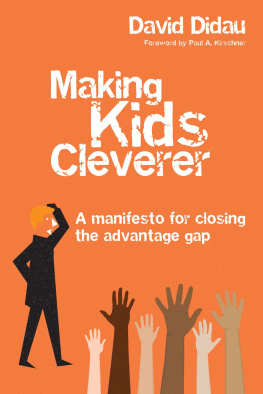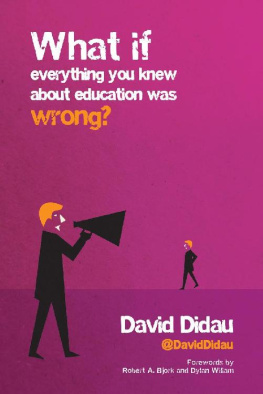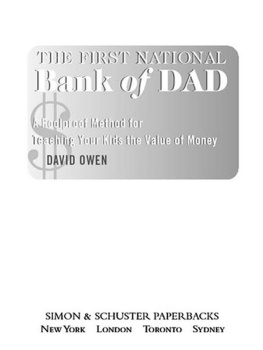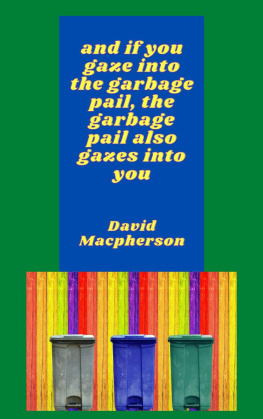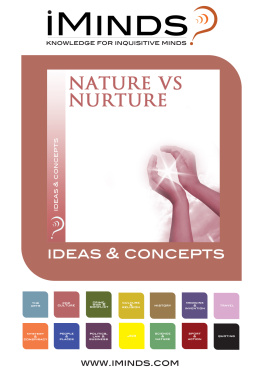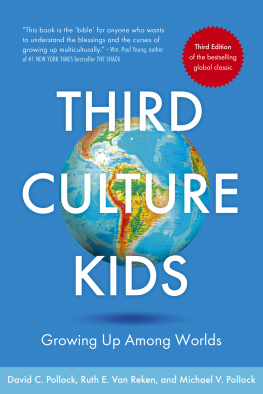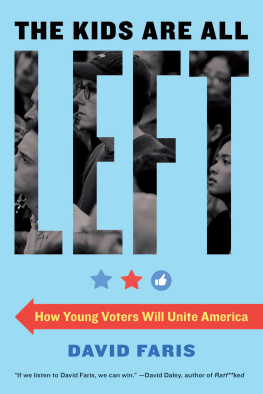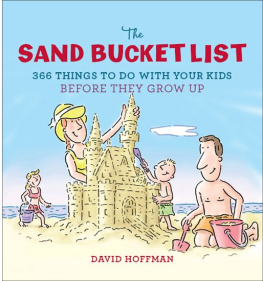David Didau - Making Kids Cleverer: A Manifesto for Closing the Advantage Gap
Here you can read online David Didau - Making Kids Cleverer: A Manifesto for Closing the Advantage Gap full text of the book (entire story) in english for free. Download pdf and epub, get meaning, cover and reviews about this ebook. genre: Children. Description of the work, (preface) as well as reviews are available. Best literature library LitArk.com created for fans of good reading and offers a wide selection of genres:
Romance novel
Science fiction
Adventure
Detective
Science
History
Home and family
Prose
Art
Politics
Computer
Non-fiction
Religion
Business
Children
Humor
Choose a favorite category and find really read worthwhile books. Enjoy immersion in the world of imagination, feel the emotions of the characters or learn something new for yourself, make an fascinating discovery.
- Book:Making Kids Cleverer: A Manifesto for Closing the Advantage Gap
- Author:
- Genre:
- Rating:5 / 5
- Favourites:Add to favourites
- Your mark:
- 100
- 1
- 2
- 3
- 4
- 5
Making Kids Cleverer: A Manifesto for Closing the Advantage Gap: summary, description and annotation
We offer to read an annotation, description, summary or preface (depends on what the author of the book "Making Kids Cleverer: A Manifesto for Closing the Advantage Gap" wrote himself). If you haven't found the necessary information about the book — write in the comments, we will try to find it.
David Didau: author's other books
Who wrote Making Kids Cleverer: A Manifesto for Closing the Advantage Gap? Find out the surname, the name of the author of the book and a list of all author's works by series.
Making Kids Cleverer: A Manifesto for Closing the Advantage Gap — read online for free the complete book (whole text) full work
Below is the text of the book, divided by pages. System saving the place of the last page read, allows you to conveniently read the book "Making Kids Cleverer: A Manifesto for Closing the Advantage Gap" online for free, without having to search again every time where you left off. Put a bookmark, and you can go to the page where you finished reading at any time.
Font size:
Interval:
Bookmark:
David Didaus latest edu-blockbuster is a compelling and endlessly fascinating read. Weaving together a wealth of evidence and ideas, from the practical to the philosophical, Making Kids Cleverer confronts the taboo topic of intelligence head-on. Didau shows us that by teaching children powerful, biologically secondary knowledge we not only increase their intelligence but also prepare them for the prospect of happiness, wealth and anything that adult life can throw at them.
I have not read another education book that brims with as much insight and stimulating thought as this one: every page serves up a new surprise or gentle provocation. Thoroughly recommended.
Andy Tharby, teacher, co-author of Making Every Lesson Count and author of How to Explain Absolutely Anything to Absolutely Anyone
Written with great precision and clarity, and with a good dash of humility and humour too, Making Kids Cleverer is a truly magnificent manifesto. Everything David Didau says chimes deeply with what I know to be true and what I am trying to accomplish in our schools, and I am of course cleverer now than I was before reading it. It is an absolute joy to read, and an incredibly timely tour de force that can, and should, have a national impact.
A must-read for everyone in education, from trainee teachers to inspectors and policy makers.
Lady Caroline Nash, Director, Future Academies
Schools and parents alike invest so much energy in teaching children and yet often understand relatively little about what exactly it is they are trying to achieve. In Making Kids Cleverer David Didau reviews everything we know from cognitive science on how to enhance childrens learning, and delivers a powerful argument that we can and must help all children succeed at school.
Rebecca Allen, Professor of Education, University College London Institute of Education
In Making Kids Cleverer David Didau provides us with a brilliant and accessible account of why knowledge is opportunity, and of how we can increase childrens knowledge through a thoughtful and scientific approach to schooling.
More than ever, children need a core set of ideas, facts, procedures and other forms of knowledge in order to help them navigate the everchanging work environment they will encounter and to fully participate in the many opportunities afforded by the modern world. In this book, Didau offers an incisive argument for the importance of knowledge and a solid framework for how to improve the knowledge base of all children.
Making Kids Cleverer will be an invaluable resource for parents, teachers and policy makers.
David C. Geary, Curators Distinguished Professor, Department of Psychological Sciences, University of Missouri
David Didau has done it again! Making Kids Cleverer is an engaging, highly readable analysis of the latest research on how we learn and what we can do to improve the achievement of our pupils.
Like his previous books, Davids latest offering contains many strong claims. Your initial reaction, like mine, may be that he has made these claims for effect, but he sticks so closely to the research evidence that you have to take his arguments seriously.
Anyone involved in the care and education of children and young people would gain a huge amount from reading this book. Highly recommended.
Dylan Wiliam, Emeritus Professor of Educational Assessment, University College London
To my bold, brilliant and beautiful
daughters, Olivia and Madeleine.

Paul A. Kirschner
How do we make kids cleverer? How do we close the advantage gap? These are not easy questions to answer as the science of education and learning is far from exact. Our problem is made even more complicated by the fact that how a person learns is influenced by so many things both internal and external which are hard to grasp and even harder to control. This being said, there is one factor that can optimise learning, make kids cleverer and, potentially, play an enormous role in closing the advantage gap. That factor is the teacher.
As an educator and researcher in the field of educational psychology Ive spent my whole academic career which now spans four decades studying how people learn and how the process can be facilitated through carefully designed interventions. What Ive learnt in all those years, from all the studies Ive conducted and from all of my attempts to help learners learn better (and maybe even to become cleverer), is that everything hinges on teachers.
For me, a teacher is an educational designer: a professional who designs, develops, implements and (hopefully) evaluates learning situations that are effective, efficient and enjoyable for the learner. That a learning situation is effective means that in the time allotted within a curriculum, either more is learned than was planned for or what is learned is done to a deeper level than expected or required. For a learning situation to be efficient the curriculum is mastered either in less time or is learned with less effort. Finally, enjoyable doesnt necessarily mean that lessons are fun (real learning is often difficult), but rather that the learner experiences success and, with that success, has a feeling of accomplishment and what is known as self-efficacy (i.e. I can do it!).
Ideally, a teacher should not be just a run-of-the-mill educational designer; they should strive to be the very best they can be: a top-quality teacher. In order to explain what I mean I will resort to an analogy with what it takes to become a top chef, both because I love to eat and because I myself before I entered academia worked as a chef in a restaurant. Top chefs perform their magic in restaurants that have attained the Nobel Prize of the gastronomic world, namely three Michelin stars. Such chefs are capable of planning and preparing tasty, healthy and beautiful dishes for anyone, be they children, finicky eaters, diners with allergies, or gourmets. And they can do this because they have deep conceptual knowledge and finely honed skills with respect to the tools (knives, ovens, pots, pans, stoves, mixers, blenders ), techniques (steam baking, hot-air baking, wood-fire baking, sauting, deep frying, blanching, freezing, cryogenic cooking ), and ingredients (vegetables, meats, grains, spices, herbs ) of the trade. A top chef knows when, how and why to use each of the tools, techniques and ingredients and also has the skills to properly implement them to get the best results in any culinary situation.
Similarly, top teachers are capable of designing and preparing effective, efficient and enjoyable learning experiences for all students, be they average or advantaged, possessing special needs or blessed with particular talents. And they can do this because they have deep conceptual knowledge and finely honed skills with respect to their tools (whiteboard, textbook, e-reader, tablet, computer, laboratory ), instructional techniques that optimise different types of learning (lectures, discussions, debate, collaboration, formative and summative assessment, feedback techniques ), and ingredients of the teaching trade (different types of questions, prompts, tasks, examples, illustrations and animations, homework, simulations ). A top teacher knows when, how and why to use each of their tools, techniques and ingredients and also has the skills to properly implement them in different situations and with different students.
This being the case, I must confess that reading this book has made me really jealous! David Didau has essentially written what I would have loved to write myself. This is a book that can and will provide teachers and anyone else interested in the project of education with most if not all of the background knowledge they need to understand how kids learn and how to make them cleverer. As such, it can and will play an important role in closing the advantage gap. In my opinion, the book you have in your hands will help teachers to graduate from knocking out reheated meals in a second-rate diner to competent chefs turning out delicious, nutritious meals. Reading this book could help teachers become the equivalent of top quality chefs in Michelin starred restaurants.
Font size:
Interval:
Bookmark:
Similar books «Making Kids Cleverer: A Manifesto for Closing the Advantage Gap»
Look at similar books to Making Kids Cleverer: A Manifesto for Closing the Advantage Gap. We have selected literature similar in name and meaning in the hope of providing readers with more options to find new, interesting, not yet read works.
Discussion, reviews of the book Making Kids Cleverer: A Manifesto for Closing the Advantage Gap and just readers' own opinions. Leave your comments, write what you think about the work, its meaning or the main characters. Specify what exactly you liked and what you didn't like, and why you think so.

